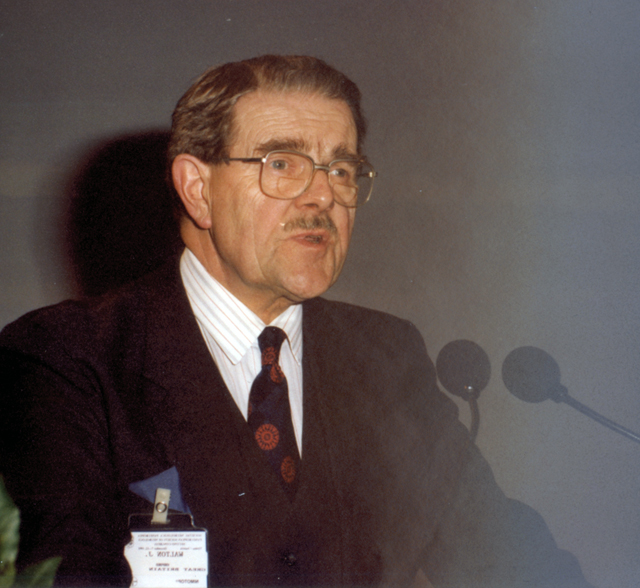Lord John Walton of Detchant, UK

Lord John Walton of Detchant
The EFNS and its Foundation
by John Walton (Lord Walton of Detchant)
On assuming the Presidency of the WFN in 1989, I was aware that a number of regional organisations, responsible for organising regional conferences, had been established, including the Asian and Oceanian, the Pan-American and the Pan-Arab Congresses. Although a number of European meetings had been established, not least the Danube Symposium, based largely upon the Central and Eastern European countries, and which had become increasingly vigorous with well-attended meetings, no Pan-European organisation existed. In organising the Danube Symposium Professor Franz Gerstenbrand of Austria was prominent; he and several colleagues proposed, in the 1970s, the establishment of a Pan-European Congress of Neurology, to be in many ways comparable to the other regional congresses already in existence. This plan, however, did not meet with universal support from many neurologists in Western Europe who felt that they has not been fully consulted about the proposals; and some even took the view that Eastern dominance of the organisation was likely to prevail. At the same time, a group of young, vigorous neurologists from France and the UK, including Gerard Said of Paris, P K Thomas and Anita Harding of London to name but three, decided to launch an organisation which would function as a European Neurological Society of individual members, owing no specific allegiance to the national societies. They intended that it should resemble in some respects the well-known organisation in the United States, known colloquially as “The Young Turks”, which had been established to bring together young people in research and clinical practice rather than those concerned with organisational and administrative matters. As President of the WFN, I confess that I was concerned to note these developments, which seemed to me to carry danger of producing a major split in European neurology. However, I was able, with the aid of colleagues, to persuade all of the national associations and societies in Europe that the organisation of a Pan-European Congress should be created, involving each of them. The first meeting was held in Vienna in December 1991, at which it was agreed to establish formally a European Federation of Neurological Societies (EFNS), which would have a coordinating role between the individual national bodies, but would also have the authority to organise biannual congresses and to establish research groups, comparable to those established internationally within the WFN and its Research Committee, so as to present to the EFNS organising committee a draft constitution and statutes, comparable in several respects to those which had been used by the WFN; with some minor modification these were accepted.
Some four years later, in Marseilles, a very successful Congress of the EFNS was held under the Chairmanship of Professor Georges Serratrice, at which he and I were honoured by being made Honorary Members of the EFNS; since that time the organisation has grown in strength and authority and has continued to organise, every two years, important neurological congresses in major European centres.
Attempts which I and others made to try to bring the EFNS and the ENS closer together stalled in the initial stages, but in more recent years, while the two organisations have continued to flourish independently, the relationships between them have been more cordial, and their activities and the dates of their congresses have been closely coordinated, so as not to clash with each other or with major international meetings, such as the World Congresses of Neurology. It has been a pleasure to see how the EFNS has grown and developed, and has continued not only to organise major congresses, but also to promote European research programmes and to improve mutual understanding and coordination between the activities of the national neurological societies.